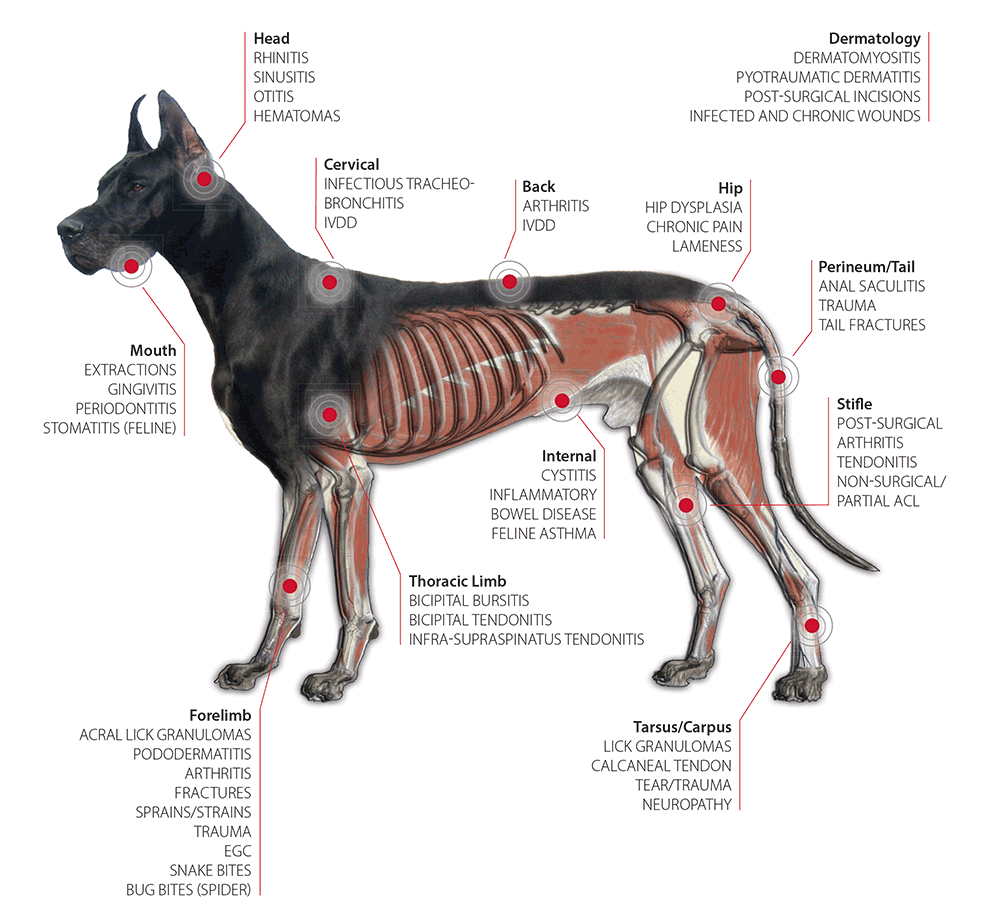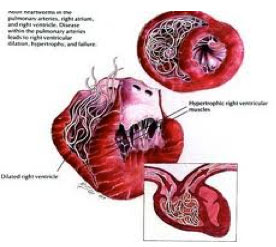Our Services
Our consultation allows time for you to express your concerns while our doctor examines your pet. This includes checking the mouth, eyes, ears, skin, glands, listening to the heart & lungs, palpating the abdomen, and giving special attention to any concerns you may have. After the exam, the doctor will explain any findings and provide recommendations and options as well as an estimate of any suggested services.
Advanced Diagnostic Imaging & In-house Laboratory
Ultrasound
We are proud to offer our clients ultrasound imagery. As the only clinic in the area with an ultrasound machine on premisis, we have ability to image vital organs otherwise unseen using digital x-ray. In addition, some conditions can only be diagnosed using an ultrasound.
Digital Radiography
Digital X-rays allow us to see the skeletal system as well as internal organs to help us to determine if there are any fractures, masses, or abnormalities.
Laboratory
We have a state of the art in-house laboratory which allows us to rapidly diagnose critical patients and screen patients for anesthesia as well as monitor closely our hospitalized patients. We can perform laboratory test such as : comprehensive blood chemistries, thyroid levels, feline leukemia, feline Immunodeficiency virus (feline AIDS), heartworm, Lyme, ehrlichia, anaplasmosis, packed cell volume and canine & feline pancreatitis. We have complete diagnostic availability to perform urinalysis, intestinal parasite tests, and countless other laboratory tests. An outside laboratory is used for diagnostic testing outside the scope of our in-house laboratory. Most of these results are still available within 12-24 hours.
Laser Therapy
We have the latest in technology when it comes to laser with Class IV Laser Therapy. Laser therapy works by using infared light to stimulate circulation, drawing water, oxygen, and nutrients to the
damaged area. This creates an optimal healing environment that reduces inflammation, swelling, muscle spasms, stiffness,
and pain. As the injured area returns to normal, function is restored and pain is relieved. 
Preventive Medicine
Preventive medicine or preventive care consists of measures taken to prevent diseases, (or injuries) rather than curing or treating their symptoms. The preventive care helps to increase the longevity and quality of the pet life along with lowering the total health care expenditure.
Preventive care/prophylactic measures are divided between primary prophylaxis (to prevent the development of a disease) and secondary prophylaxis (whereby the disease has already developed and the patient is protected against worsening of this process).
Primary prophylaxis includes:
1. Vaccinations
2. Deworming
3. Heart and Flea preventions
4. Dental Prophylaxis
Secondary prophylaxis includes:
1. A screening process which aims to identify individuals who exhibit early signs of disease by way of regular
2. Comprehensive physical exams
3. Diagnostic work up/ nutritional and behavioral counseling to develop appropriate strategy to cure or slow down the progression of the disease.
At Prince Charles Animal Hospital, we are passionate about preventive care and early detection of health problems in your pet using modern diagnostics tools. We combine the service of skilled professionals to improve life-expectancy and quality of life.
Surgery
We understand that surgery and anesthesia can be a stressful time for you and your pet. We will do all we can to minimize any stress and discomfort, and to maximize safety. Prior to surgery, pets are required to have an examination where the veterinarian and technician will discuss the upcoming procedure and answer any questions or concerns. From spay and neuter services to more complex surgical procedures, we at Prince Charles Animal Hospital always operate with safety in mind.
We recommend and believe that through performing comprehensive physical exam and pre-anesthetic blood work, we will be able to make sure your pet is healthy enough for the procedure. Based on the pre-anesthetic comprehensive physical exam and blood work, abnormalities if any are addressed and anesthetic protocol are selected to ensure safety and well-being of the pet and if necessary, surgery is postponed or even canceled until it is safe.
Our surgical suite is fully equipped with modern anesthetic, surgery and patient monitoring tools used to measure your pet's vital signs such as respiration, heart rate, body temperature, electrocardiogram and blood pressure before, during and after all procedures requiring anesthesia. In addition our veterinary technicians regularly check all vitals at regular intervals to make sure your pet remains safe and comfortable throughout the procedure.
Sedatives and pain medications are administered during and after surgery to minimize stress and pain. After surgery, the pet is moved to warm and safe area where we closely monitor for vital signs to ensure the smooth and safe recovery.
Someone from our office will notify you when your animal is ready to be picked up at which point you will be provided with detailed discharge instructions. Finally, after you've picked up your pet, we will generally follow up with you by phone to check on your pet's recovery.
Our animal surgery services include:
• Spays
• Neuters
• Entropion/ Ectropion Repair
• Bladder Stone Removal
• Lump Removals
• Cruciate ligament Surgery
• Luxating Patella Correction
• Exploratory Surgery
• Foreign Body Removal
• Soft Tissue Surgery
• Laceration Repair
Dental Prophylaxis
Remember - your pets need dental care too! Your pet needs to have its teeth cleaned regularly. According to the American Veterinary Dental Society, more than 80% of dogs and 70% of cats have dental disease by the age of 3. Dental (or periodontal) disease is the most frequently diagnosed health problem in pets.
Common signs of dental disease include:
• Yellow or brown buildup (tartar) on the teeth
• Red, swollen, or bleeding gums
• Bad breath
• Excessive drooling
• Changes in eating or chewing habits
• Pawing at the face
• Loose teeth
• Depression
Bacteria that form as plaque on the teeth enters the bloodstream with each bite and swallow. This bacteria can contribute to organ disease especially kidneys, liver, and heart. Regular dental care is one of the most important ways to promote pet health. We will help you develop the best dental plan for your pet. This includes professional teeth cleaning for dogs and cats, any necessary extractions, as well as diet, pet nutrition and recommendations for a good at home dental care routine. Call today to have your pet's teeth examined.
Diets/Nutritional Counseling
Nutritional Counseling/Prescription Diets and Neutraceuticals:
Some pets require special food, and all pets benefit from a balanced diet. Our veterinarians are able to help you choose the right diet for your pet to keep him or her happy, healthy and active. We also believe that helping pets with the least invasive treatments is ideal and usually more cost effective. This is why we have a wide range of therapeutic diets that can aid with such ailments as obesity, diabetes, kidney disease, and food allergy, dental disease, hyperthyroidism just to name a few.
Sometime the pets need neutraceuticals and supplements to maintain active brain functionality, strong joints, a healthy coat, and a healthy digestive system. The most common supplement given to pets is a multi-vitamin and fatty acids which reduce shedding and improve the pet's coat. Other popular supplements are probiotics, and antioxidants. Vitamins and other supplements are also available if indicated.
Flea Prevention
Fleas are small, brown or black, wingless, rapid-moving insects that feed on blood by biting pets and, occasionally, people. They can live without food for several months, but females must have a blood meal before they can produceeggs. They can deliver about 4000 eggs on the host's fur. The eggs go through four lifecycle stages: embryo, larva pupa, and imago(adult).This whole life cyclefrom egg to adult takes from two to three weeks, although this depends on the temperature. It may take longer in cool conditions.
They can cause anemia, allergies and severe itching. Significant numbers of fleas can cause life threatening blood loss to young, elderly or debilitated pets.
Some dogs and cats develop a marked hypersensitivity to the saliva of fleas and experience intense itching which results in skin abrasions, hair loss, and secondary pyoderma . Fleas are also an intermediate host for tapeworms and If a pet ingests a flea during grooming, he or she could become infected with immature tapeworms that can be carried by fleas.
Flea infestation can be diagnosed by finding fleas on the dog or by seeing black-and-white, salt-and-pepper-like grains in the coat. These particles are flea feces (the “pepper”) and flea eggs (the “salt”). Fecal material is made up of digested blood. When brushed onto a wet paper, it turns a reddish brown.
Complete flea control consists of treating both the environment (including house and yard) and the pet. Ideally, fleas should be killed before they feed on the pet to reduce the potential for skin allergies and other health problems.
Heartworm Prevention
Heartworm Disease – An Update
Prevention is your dog's best bet against heartworm disease.
April is the time of the year when veterinarians start to check dogs for exposure to heartworm disease and start heartworm prevention that they may have been infected with during the previous mosquito season.
If mosquitoes are biting you, chances are they're biting your pet too and one mosquito bite can cause the parasite to enter a pet’s body and mature into long worms that live in the heart and major vessels surrounding the heart. Once there, the worms grow, feeding off the lining of the heart and plugging essential blood vessels. Untreated, the disease leads to significant and deadly damage to the pet’s heart, lungs, kidneys and liver. Clinical signs seen in dogs include cough, difficulty breathing, weight loss, exercise intolerance, and eventually heart failure and death.
Unlike intestinal parasites, which can be easily treated, treating a heartworm infestation is very expensive, sometimes difficult and dangerous. It is far easier and more effective to prevent the problem in the first place. In theory, the best way to prevent heartworms is to keep your dog from being bitten by a mosquito. Unfortunately, preventing mosquito bites can never be 100 percent effective.

A prevention program should be started at 6 to 8 weeks of age in endemic areas, or as soon thereafter as climate conditions dictate. In the Deep South, where mosquitoes are a year-round problem, dogs should be kept on preventive drugs all year long. In areas where it is not necessary to administer the drug year round, start one month before the mosquito season and continue one month beyond the first frost (generally from May or June to November or December).
If your dog is not taking preventive medicine and is six months or older, he may already be infected with reproducing adult heartworms. Your veterinarian needs to use a blood test to confirm that your pet is heartworm-free before your dog can start taking the medication.
Why? If an infected dog takes heartworm prevention he runs the risk of an anaphylactic-shock reaction because the treatment involves a sudden killing of microfilaria, or baby heartworms, present in the bloodstream.
If you have questions about this or any medical topic, please call us today at 905-735-1117.